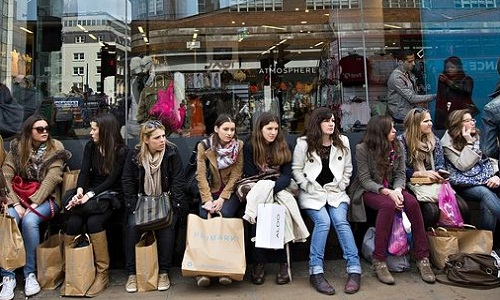"Whether it is Spring/Summer or Autumn/Winter, fashion changes every season and fashionistas across the globe are increasingly becoming obsessed with changing their clothes and style as per the latest offerings from the iconic fast fashion brands. With each new season, garments of the previous collection are becoming redundant thus giving a high to the fashion brands."

Whether it is Spring/Summer or Autumn/Winter, fashion changes every season and fashionistas across the globe are increasingly becoming obsessed with changing their clothes and style as per the latest offerings from the iconic fast fashion brands. With each new season, garments of the previous collection are becoming redundant thus giving a high to the fashion brands.
Today the global fashion industry is worth $1.2 trillion, and more than $250 billion of this is spent annually in the US alone. Fast fashion as a concept is actually a business model that moves designs from the runway to stores quickly to capture current trends and typically includes inexpensive, poorly constructed garments that can be ruined after a couple of trips through the washing machine.

While fast fashion marketers are minting money, the fickleness of trends and the demand for clothing is raising concern amongst brands and consumers about the environmental impact. They are willing to focus on incorporating sustainability into their business models. Brands willing to create sustainable fashion require a two pronged effort. While brands need to make products that minimize any negative impact on the environment, it also improves the working conditions for everyone involved in design and manufacturing.
Environmental hazard of fast fashion
The fashion industry is among the most polluting in the world, with a number of chemicals and water being used produce clothing. Wastewater discharged by mills each year contains harmful chemicals such as formaldehyde, chlorine and heavy metals such as lead and mercury which causes global industrial water pollution. Moreover cotton production use up a significant amount of water resources.
Another worrying aspect of fast fashion industry is the human cost it involves. Garment manufacturing is the third-largest industry in the world, producing about $700 billion annually. However the working conditions of many of the millions of workers employed in garment manufacturing are of great concern. In April 2013 more than 1,100 Bangladeshi workers were killed when the Rana Plaza garment factory collapsed. The year before, 117 people were killed when a fire swept through another factory in Bangladesh.
New sustainable fashion brands emerging globally
Amidst rising concern of for environmen, a new trend is emerging as increasing number of brands are working towards sustainable fashion. In the last few years brands which believe in sustainable fashion, have striving hard to create an antithesis of fast fashion. The Los Angeles based brand Tom Cridland is responsible for the 30 Year T-Shirt, the 30 Year Sweatshirt and the 30 Year Jacket. The founder, Tom Cridland, and its managing director, Deborah Marx strongly disapproves the tendency for once-worn clothing to be discarded. According to them concept is a fun way to promote sustainability while not preaching about environmentalism and clothing manufacturing rights. Celebrities like Leonardo DiCaprio, Rod Stewart and Ben Stiller have come forward to promote the brand.
Several fashion-forward brands are striving to promote the concept clothes can be inexpensive, ethically made and sustainable. Asos Eco Edit Online fashion retailing giant has an exclusive ‘Eco Edit' section that features a wide range of what it says are sustainable clothing, accessories and beauty items, including handcrafted jewelry to up cycled vintage pieces. Another iconic high end designer Stella McCartney is a strong believer of vegan living and the brand doesn’t use any leather or fur in its designs. Patagonia, the brand, which caters to outdoor apparel needs, has also committed to monitoring all stages of production closely to ensure that all products are produced under safe, fair, legal and humane working conditions throughout the supply chain. The quintessential brand for jeans Levi’s has created a collection called Levi's Waste Less,which features clothing made of 20 percent postconsumer waste — specifically, recycled plastic bottles. Three to eight plastics bottle are used per pair of WasteLess jeans.
Many other prominent fast fashion brands like H&M and Zara are also taking up initiatives to cover up the darker side of the fast fashion business.












